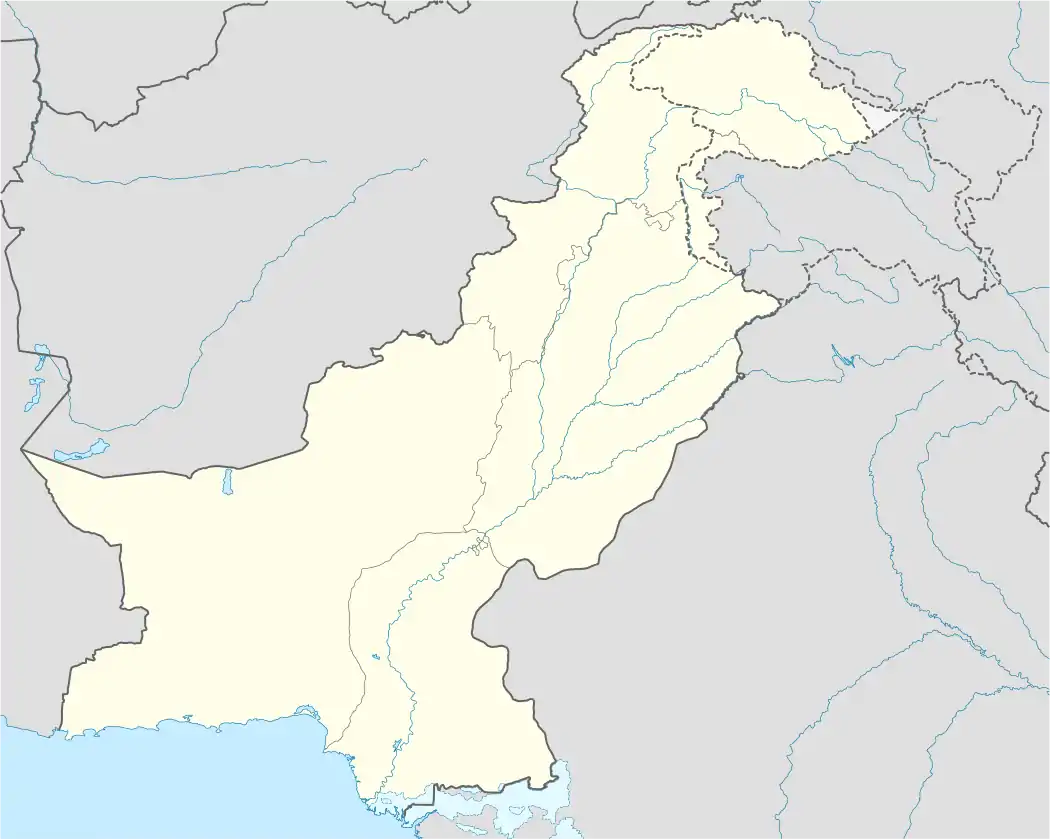Hadali | |
|---|---|
 Location in Pakistan | |
| Coordinates: 32°17′32″N 72°11′32″E / 32.29222°N 72.19222°E | |
| Country | Pakistan |
| Province | Punjab |
| Elevation | 188 m (617 ft) |
| Population (2017) | 53,669[1] |
Hadali (Urdu: ہڈالی) is a town located in Khushab District in the Punjab Province of Pakistan. The town is administratively subdivided into two Union Councils, including Hadali-Ii.[2][3]
History
Khushab District was a forested agricultural region during the Indus Valley civilization. The Vedic period was characterized by Indo-Aryan culture that invaded from Central Asia and settled in the Punjab region. The Kambojas, Daradas, Kaikayas, Madras, Pauravas, Yaudheyas, Malavas, and Kurus invaded, settled and ruled the ancient Punjab region.
After overrunning the Achaemenid Empire in 331 BCE, Alexander the Great marched into the Punjab region with an army of 50,000. The Khushab region was ruled by Maurya Empire, Indo-Greek kingdom, Kushan Empire, Gupta Empire, White Huns, Kushano-Hephthalites and the Turk and Hindu Shahi kingdoms.
In 997 CE, Sultan Mahmud Ghaznavi, took over the Ghaznavid dynasty empire established by his father, Sultan Sebuktegin. In 1005, he conquered the Shahis in Kabul in 1005, and followed it by the conquests of the Punjab region. The Delhi Sultanate and, later, the Mughal Empire ruled the region. The Punjab region became predominantly Muslim due to missionary Sufi saints whose dargahs dot the landscape.
After the decline of the Mughal Empire, the Sikh Empire invaded and occupied the Khushab District. During the period of British rule, Khushab district increased in population and importance.
The predominantly Muslim population of Khushab District supported the Muslim League and Pakistan movement. After independence in 1947, the minority Hindus and Sikhs migrated to India while the Muslim refugees, Rajputs, from India settled in the Hadali after Partition of India and Pakistan in 1947. Muslim Rajputs who migrated to India settled in the Hadali.
Economy
Hadali's main source of income is agriculture. The main crops cultivated in Hadali are sugarcane, wheat and rice.[4]
The practice of cattle-farming also contributes to the economy in Hadali.
Notable people
- Nilofar Bakhtiar (Chairperson of the National Commission on the Status of Women (NCSW)), (Former Federal Minister for Tourism of Pakistan)[5]
- Malik Khuda Buksh Tiwana, veteran politician, member National Assembly of Pakistan from Khushab District
- Khushwant Singh (1915 - 2014) was an Indian Sikh journalist and novelist born in 1915 in Hadali. Some of his ashes were scattered in Hadali.[6]
- Brigadier (R) Rashid Ali Malik (died in 2017) (1.Sitara-e-Imtiaz , 2.Tamgha-e-Basalat)
References
- ↑ Hadali population per 2017 census Citypopulation.de website, Retrieved 1 March 2023
- ↑ "Tehsils & Unions in the District of Khushab including Hadali". National Reconstruction Bureau, Government of Pakistan website. Archived from the original on 24 January 2008. Retrieved 27 February 2023.
- ↑ Location of Hadali – Falling Rain Genomics
- ↑ "Natural Resources of Hadali". Punjab Portal website. Retrieved 27 February 2023.
- ↑ "Profile of Senator Nilofar Bakhtiar". Senate of Pakistan website. Archived from the original on 27 September 2007. Retrieved 1 March 2023.
- ↑ Jawad Naqvi (23 March 2014). "Fistful of Khushwant's ashes saved for Pakistan". Dawn (newspaper). Retrieved 27 February 2023.